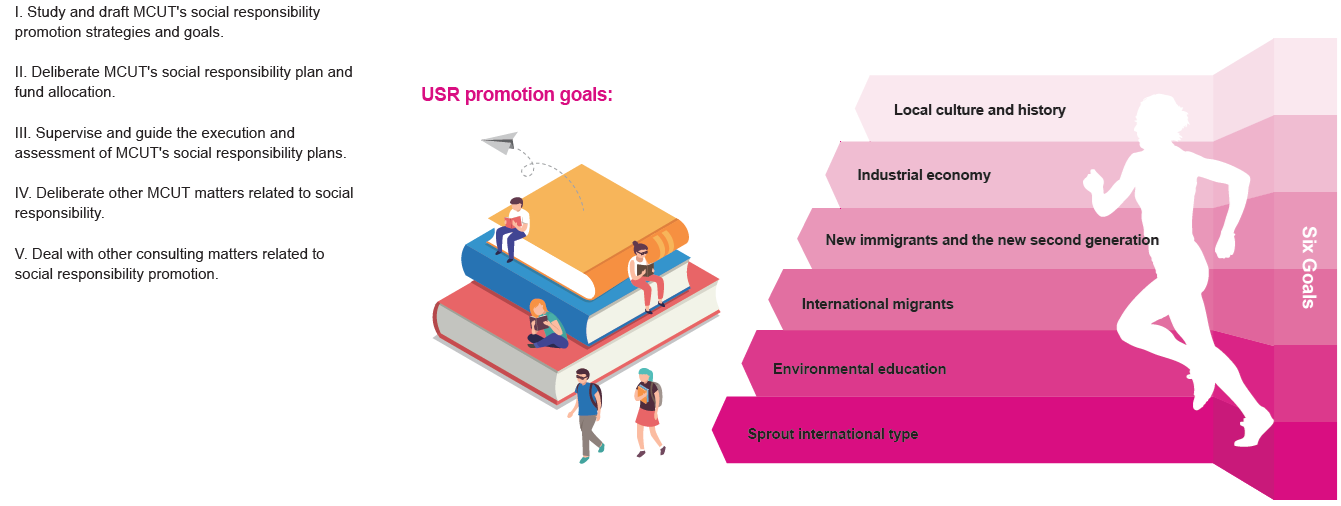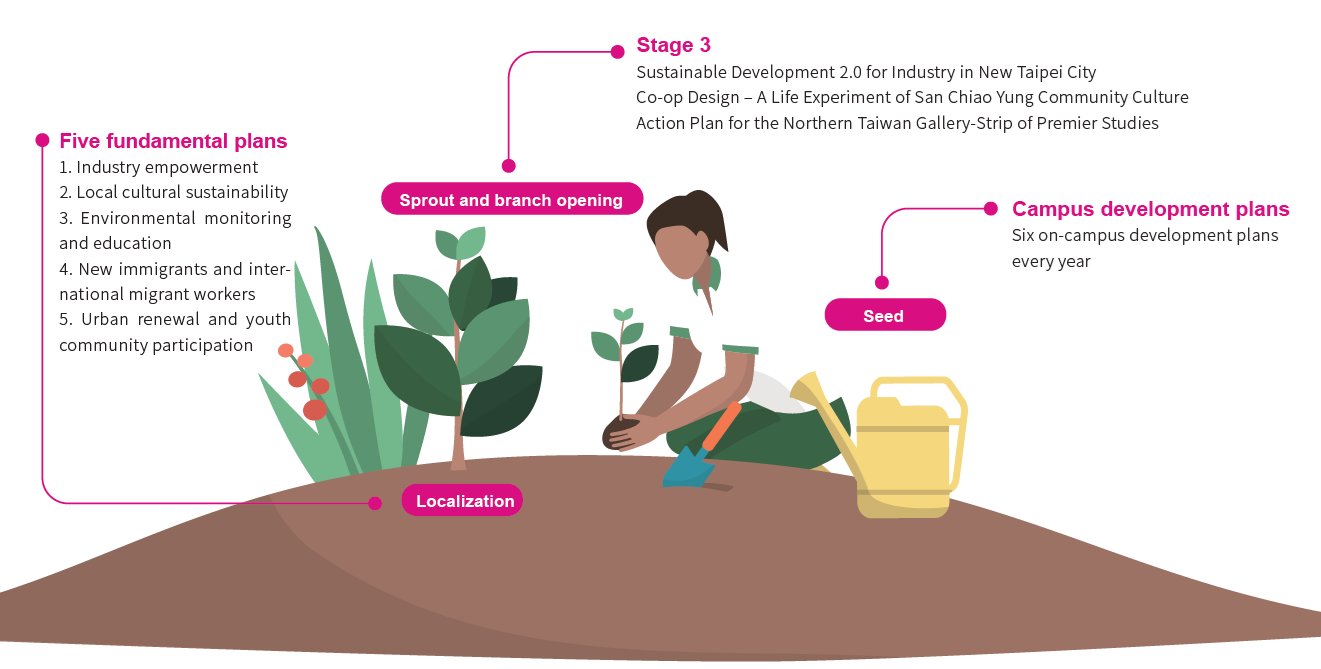USR Practice
USR Vision and Goals
Ming Chi University of Technology envisions leveraging its resources to support society by understanding local characteristics and developmental needs, while actively engaging in community participation to embody the essence of knowledge. We uphold the founding philosophy of the Kun-Chung brothers, which emphasizes the principle of 'taking from society, using for society.' Committed to long-term dedication to social welfare, fostering regional connections, ensuring sustainable environments, and fulfilling our University Social Responsibility (USR), the university established the 'University Social Responsibility Promotion Committee' in 2019. This committee has since formulated regulations guiding its establishment and function. The responsibilities of the University Social Responsibility Promotion Committee include the following:
Promotion Organization
The University Social Responsibility Promotion consists of 13 to 17 members and holds meetings at least once each academic year. In addition to reviewing the incubation type (category A) and sprout type (category B) of MCUT's USR plan and discussing the execution direction, we also invite key communicative and cooperative groups to convene USR local forums and publish an annual report on USR implementation at the end of each year. This process aims to assess the performance of the plan and make timely adjustments based on field needs. During the meeting, a quorum of more than half of all committee members must attend, and resolutions require the consent of more than half of the attending members.
The university's Office of University Social Responsibility Promotion is tasked with coordinating, planning, and promoting USR practices and resource allocation to meet MCUT's social responsibility objectives. The office holds a regular monthly meeting to discuss the status of each planned initiative and has established key units for university social responsibility. Additionally, initiatives such as connecting the university with local industries through the College of Management and Design and creating the Action-oriented Office and Southeast Asian Culture Center have been implemented to integrate USR into teaching and administrative planning.
Practice Plan
MCUT implements the USR practice plan released by the Ministry of Education. Through New Taipei Sustainable Development 2.0 for Industry in New Taipei City, Action Plan for the Northern Taiwan Gallery-Strip of Premier Studies, and Co-op Design - A Life Experiment of San Chiao Yung Community Culture, we focus on “Industrial Linkage,” “Social Care,” “Environmental Ecology,” and “Cultural Preservation/Local Culture and History,” and have developed 6 sustainability plans accordingly, including “Academy and Community Creation,” “Social Care,” “New Immigrant Families,” “Environmental Monitoring and Education,” “Base Plan,” and “Industrial Economy Sustainability.” We are leveraging the local cultivation strength of our Action-oriented Office and Southeast Asian Cultural Center, integrating the professional knowledge and skills from our College of Engineering, College of Environment Resources, and College of Management and Design. Through this, we have established cooperation platforms with partner schools and connected with local government agencies, clubs, schools, and communities to create mutually beneficial partnerships and collaboratively address local issues.
Annual Plan of Office of University Social Responsibility Promotion
The Office of University Social Responsibility Promotion holds the "USR Plan Coordination Meeting" in the second week of each month to track the progress of 9 incubation-type plans (category A), two sprout-type plans (category B), and 1 deep cultivation type plan (category C). This meeting verifies the relevant handling conditions. The office also organizes USR expert lectures in the fourth week of each month to encourage cross-domain and cross-school dialogues. In 2024, MCUT expanded the construction of five fundamental plans (USR Hub) to develop effective issue networks for mutual support. The university also encourages teachers from various disciplinary backgrounds to participate in USR and guide both teachers and students in jointly addressing field issues through relevant courses. In 2024, MCUT's USR plan received subsidies of NT$12.05 million. An additional NT$1.80 million of self-raised funds was allocated to support 3 USR plans. Furthermore, an extra budget of NT$2 million was used to support MCUT's fundamental programs and six incubation-type plans. To encourage reflection on issues like environmental sustainability, industrial innovation, and care for the disadvantaged, and to adhere to the tenet of "Local Connection and Social Responsibility," MCUT allocates NT$2 million each year to solicit proposals for USR incubation-type plans. The university also collaborates with public sectors, NGOs/NPOs, and schools at every level to address field issues. In 2024, 10 proposals were solicited from teachers in each college and department.
Promotion Performance of Sustainable Development 2.0 for Industry in New Taipei City
Sustainable Development 2.0 for Industry in New Taipei City aimed to guide the economic sustainability of industrial clusters in New Taipei City. During the guidance process, it was found that industries in this area faced multiple challenges, including insufficient quality of local workers, international trade issues, a lack of awareness of SDGs, and difficulties in intelligent transformation. Therefore, while building on past foundations, we promoted the intelligent upgrading and transformation of enterprises, added value to diversified products, and linked government resources to provide vendors with more assistance. Through innovative education courses, interdisciplinary cooperation, and ESG action plans, we strived to foster the joint development of universities, regional industries, and social cultural resources, improve the competitiveness of the regional economy, and enhance the ecological environment for economic sustainability in New Taipei City.
The execution of this plan focused on economic sustainability and provided technical or R&D guidance to vendors while also promoting ESG action plans related to energy conservation and carbon reduction. Regarding talent cultivation, we collaborated with relevant enterprises to launch innovative educational courses aimed at enhancing students’ problem-solving abilities and interdisciplinary integration skills. To address economic sustainability issues in the industries, we held 20 industrial forums, covering themes such as precious metal recycling technology and sustainable product design. Furthermore, through online media, we broadened the reach of this plan and showcased relevant films about 10 industrial sustainability issues, including waste reduction design, innovative operating models, and industrial linkages.
Regarding the substantial progress of this plan, 169 vendors in New Taipei City were visited to understand the industrial trends in the region. Subsequently, relevant demands were collected, and the energy of the interdisciplinary and cross-campus teams was harnessed. In terms of technology and R&D, we aided in process improvements and intelligent upgrades to create a welcoming work environment that attracted talent. We guided 21 vendors, including Taiwan Fuji Die Co., Ltd., Flaxcom Technology Corporation, and Hi-lai Packing Co., Ltd., and assisted vendors such as Gianni Industries Inc., EEZCARE Medical Corp., and Single Well Industrial Corp. in promoting seven carbon inventory initiatives focused on energy conservation, carbon reduction, and carbon inventory. For talent development, we collaborated with Nanya Technology to launch innovative and integrated practical interdisciplinary PBL courses addressing green sustainability issues and partnered with ZeroNet International to offer an introductory programming course for children, aiming to enhance their logical thinking from kindergarten through elementary school. A total of ten innovative education courses were conducted, attracting 3,096 participants. Additionally, 286 teachers and students visited a wastewater treatment plant in New Taipei Industrial Park, the Bali Refuse Incineration Plant, MSI, and Reel Mask Industry Co., Ltd. Moreover, President Luo of Uwin Nanotech Co., Ltd. was invited to discuss the circular economy of 3C electronic products and corporate sustainable development, while Department Manager Yang from Nanya Technology was invited to present a lecture on corporate spirit, functionality, and workplace culture. In total, 20 industrial forums were held to promote industrial sustainability, with 1,070 participants. During the implementation of the plan, 10 corresponding videos were recorded and created to share topics such as waste reduction design, innovative operating models, and the promotion of local creation.





